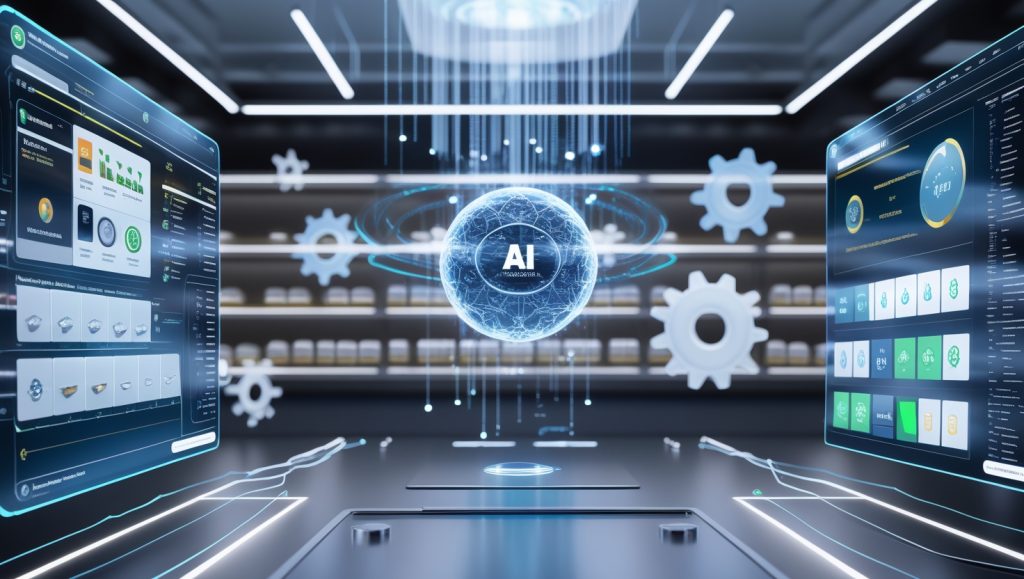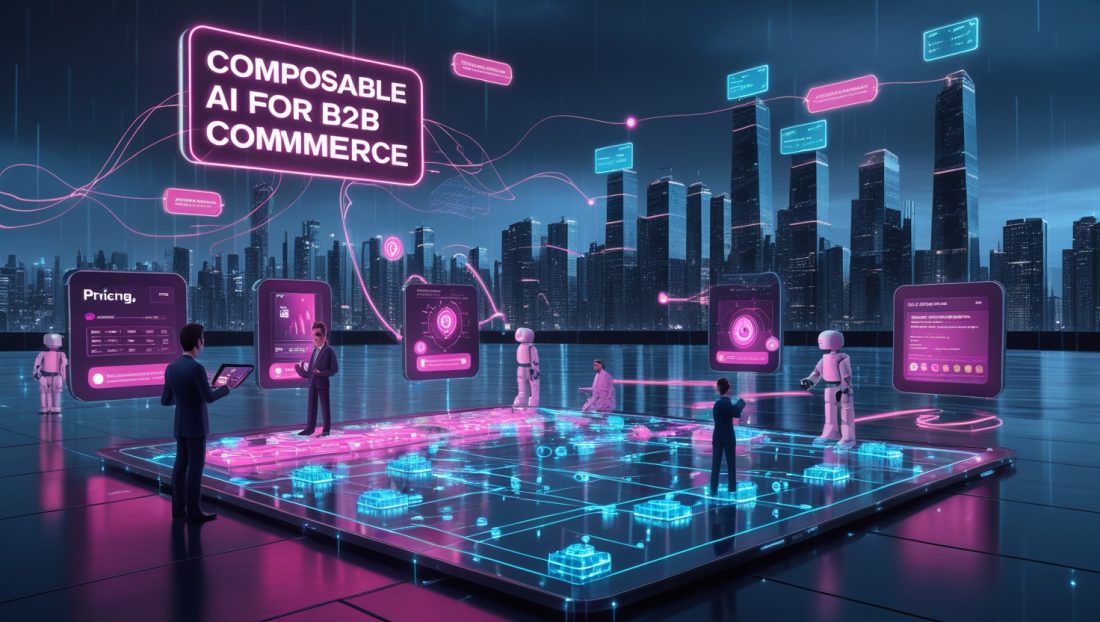Why Composable AI is the Future of B2B Commerce
What if businesses could adapt to market shifts as swiftly as a startup, while maintaining the infrastructure of an enterprise? This is the promise of composable AI for B2B commerce—a paradigm shift from rigid, monolithic systems to modular architectures that integrate best-in-class tools.
In 2025, B2B companies face unprecedented pressure: 68% of buyers demand hyper-personalized experiences, while supply chain volatility and ESG mandates require real-time adaptability. Traditional platforms, burdened by code bloat and vendor lock-in, struggle to keep pace. Enter composable AI—a fusion of modular design and machine learning that empowers businesses to scale, automate, and innovate without overhauling legacy systems.
Ready to transform B2B commerce? Download our premium course for 6 steps and an exclusive AI strategy checklist. Get the Course
1. Modular Agility: Building Systems That Evolve

Monolithic platforms force businesses into a straitjacket of predefined workflows. By contrast, composable architectures allow enterprises to assemble and reassemble components like Lego blocks. For example:
- AI-Powered Pricing Engines: Replace static pricing models with dynamic tools that analyze competitor data, customer history, and supply chain costs.
- Inventory APIs: Integrate IoT sensors and blockchain trackers to monitor stock levels across global warehouses.
- Personalization Modules: Deploy machine learning algorithms to tailor catalogs based on buyer roles, industries, or procurement cycles.
Real-World Example: Siemens Energy adopted a composable AI system to streamline its renewable energy equipment sales. By integrating predictive maintenance APIs with ERP data, the company reduced downtime by 22% and improved cross-departmental decision-making.
Why Modular AI Systems Outshine Legacy Platforms
Modular AI systems, a cornerstone of composable AI for B2B commerce, allow businesses to swap out or upgrade individual components without disrupting entire operations. This flexibility is critical in industries like manufacturing, where rapid adaptation to supply chain disruptions is non-negotiable. For instance, integrating IoT-driven inventory APIs can optimize stock management, as seen in advanced automation solutions explored in Switzerlands Autonomous Delivery Robots Crushing Global Supply Chain Challenges.
Unlike rigid ERP systems, modular AI ensures scalability, letting businesses adopt cutting-edge tools like AI-driven commerce solutions without costly overhauls. This approach not only reduces downtime but also empowers companies to stay competitive in volatile markets.
The Role of APIs in Scalable AI Solutions
APIs are the glue of composable AI for B2B commerce, enabling seamless integration of disparate systems. For example, connecting AI pricing engines with real-time market data APIs allows businesses to adjust quotes dynamically, as BASF did to cut pricing errors. This mirrors innovations in Robotic Microfactories for On-Demand Manufacturing, where APIs enable rapid production scaling. By prioritizing open APIs, companies can future-proof their tech stacks, ensuring they’re ready for emerging trends like scalable AI solutions in logistics and procurement.
2. Automation: Precision in Complex Processes
B2B transactions involve intricate workflows—multi-tiered approvals, compliance checks, and cross-border logistics. Manual processes are error-prone and inefficient. Composable AI for B2B commerce addresses this by embedding automation into core operations:
Dynamic Pricing and Risk Mitigation
Chemical supplier BASF uses AI-driven pricing modules to adjust quotes in real time. The system factors in raw material costs, geopolitical risks, and sustainability premiums, reducing pricing errors by 17% (McKinsey, 2024).
Regulatory Compliance
A Fortune 500 pharmaceutical company automated ESG reporting using composable AI tools. The platform scans supplier contracts, flags non-compliant clauses, and generates audit-ready documentation, cutting compliance costs by 31%.
Why B2B Automation Reduces Human Error
Automation powered by composable AI for B2B commerce eliminates the inefficiencies of manual workflows, particularly in high-stakes processes like pricing and compliance. By integrating AI-driven tools, businesses can process vast datasets in real time, ensuring precision. For example, BASF’s pricing module leverages B2B automation to account for volatile raw material costs, a strategy also seen in AI-Driven Automation Revolutionizing Grocery. This precision not only cuts errors but also builds trust with buyers who demand transparency and accuracy in complex transactions.
The Power of AI in Streamlining Logistics on Composable AI for B2B commerce
Logistics, a pain point in B2B commerce, benefits immensely from composable AI. By integrating IoT sensors and AI analytics, companies can track shipments and optimize routes in real time. This aligns with breakthroughs in Aerial Construction Drones: The Future of Safe Building, where modular AI systems enhance operational efficiency. For B2B firms, this means faster delivery times, reduced costs, and improved customer satisfaction, making AI-driven commerce a game-changer for global supply chains.
3. Personalization: Beyond Basic Customization

B2B buyers no longer tolerate generic portals. A 2025 report by Accenture reveals that 73% of procurement teams abandon vendors offering static pricing or irrelevant product suggestions. Composable AI for B2B commerce enables granular personalization:
Role-Based Experiences
- Procurement Managers: See bulk pricing, MOQs, and sustainability certifications.
- C-Suite Executives: Access ROI calculators and ESG impact dashboards.
Case Study: Grainger, an industrial supplies distributor, deployed composable AI to create dynamic catalogs for its 5 million+ SKUs. By analyzing purchase history and industry trends, the platform surfaces relevant products, boosting cross-sell revenue by 28%.
Why Personalization Drives B2B Loyalty
Personalization through composable AI for B2B commerce transforms buyer experiences by delivering tailored solutions at scale. By leveraging machine learning to analyze purchase patterns, companies like Grainger create dynamic, role-specific interfaces that boost engagement. This mirrors advancements in AI-Powered Content Discovery: Netflix’s 2025 Fix, where AI curates user-specific content. In B2B, this translates to higher retention rates, as buyers value vendors who anticipate their needs with precision.
Data-Driven Insights for Hyper-Personalization
The backbone of personalization in composable AI for B2B commerce lies in data analytics. By integrating AI modules with CRM and ERP systems, businesses can predict buyer preferences and tailor offerings. For instance, machine learning models can identify industry-specific needs, much like AI in Quantum Marketing: Consumer Behavior, which uses predictive analytics to refine targeting. This data-driven approach ensures scalable AI solutions deliver value, driving revenue through upselling and cross-selling opportunities.
With composable AI for B2B commerce, companies deliver tailored experiences, like dynamic catalogs for procurement managers or ROI dashboards for executives. A 2025 Forrester report shows a 19% boost in buyer satisfaction from such personalization. However, robust data governance is critical to maintain trust and avoid privacy risks.
4. Overcoming Implementation Hurdles
While transformative, composable AI for B2B commerce adoption isn’t without challenges:
Data Security Concerns
Modular systems rely on APIs, increasing exposure to cyberattacks. In 2024, a major automotive parts supplier suffered a breach via an unsecured third-party inventory module. Solution? Partner with platforms offering end-to-end encryption and zero-trust frameworks.
Skill Gaps
API integration and microservices management require niche expertise. Companies like Deloitte now offer “composable readiness” training programs, upskilling IT teams in agile development and AI governance.
Why Security is Non-Negotiable for Composable AI
The reliance on APIs in composable AI for B2B commerce introduces vulnerabilities, as seen in the 2024 automotive breach. Robust cybersecurity measures, like those discussed in AI-Driven Cybersecurity: Threat Detection Master, are critical. Zero-trust frameworks and encrypted APIs ensure data integrity, allowing businesses to scale modular AI systems confidently. Without these safeguards, companies risk costly breaches that undermine trust and scalability.
Bridging the Talent Gap for Modular AI Systems
Implementing composable AI requires skilled teams proficient in microservices and AI governance. The skills shortage is a real barrier, but training programs and partnerships, as highlighted in Why STEM Robotics Competitions Are Fueling, can address this. By investing in upskilling, businesses can unlock the full potential of B2B automation, ensuring smooth integration and long-term success.
5. Sustainability and Autonomous Commerce

Composable AI for B2B commerce isn’t just about efficiency—it’s a catalyst for ethical growth:
Circular Supply Chains
Unilever uses composable AI to track raw materials from source to resale. Blockchain modules verify ethical sourcing, while machine learning optimizes recycling workflows, reducing waste by 14% annually.
AI Procurement Agents
Gartner predicts that by 2026, 45% of B2B negotiations will be handled by autonomous AI agents. These bots analyze supplier performance, negotiate terms, and ensure compliance with carbon-neutral pledges.
Why Sustainability is a Core Benefit of Composable AI
Sustainability is no longer optional; it’s a competitive edge. Composable AI for B2B commerce enables circular supply chains by integrating blockchain and AI to track and optimize resource use. This aligns with innovations in Robotics in Recycling: Reshaping Global, where AI-driven systems reduce waste. For B2B firms, this means meeting ESG mandates while cutting costs, a win-win for profitability and the planet.
The Rise of Autonomous AI Agents in B2B
Autonomous AI agents are redefining procurement, as predicted by Gartner. These agents, powered by composable AI, negotiate contracts and ensure compliance with minimal human input. This mirrors advancements in Agentic AI: The Rise of Autonomous Decision-Making, where AI takes on complex tasks. For B2B commerce, this translates to faster, smarter negotiations, freeing up teams to focus on strategy and innovation.
FAQ: Addressing Common Questions
Is composable AI cost-effective for mid-sized businesses?
Yes. Cloud-native solutions like Shopify Plus and Adobe Commerce offer pay-as-you-go pricing, allowing smaller firms to scale modules as needed.
How does composable AI differ from traditional ERP systems?
ERPs are monolithic; composable AI for B2B commerce lets businesses integrate specialized tools (e.g., AI chatbots, blockchain trackers) without disrupting core systems.
What industries benefit most?
Manufacturing, healthcare, and logistics—sectors requiring real-time data synchronization and complex workflow automation.
Act Now or Risk Obsolescence
The era of rigid, one-size-fits-all platforms is over. Composable AI for B2B commerce isn’t a luxury—it’s a necessity for survival in 2025’s volatile market. From automating compliance to enabling hyper-personalization, this approach future-proofs operations while aligning with sustainability goals.
Ready to Lead?
- Explore Solutions: SAP’s Modular Commerce Cloud
- Download Our Guide: Future-Proofing B2B Strategies
- Subscribe for Updates: Stay ahead with monthly insights on AI-driven commerce and trends.

